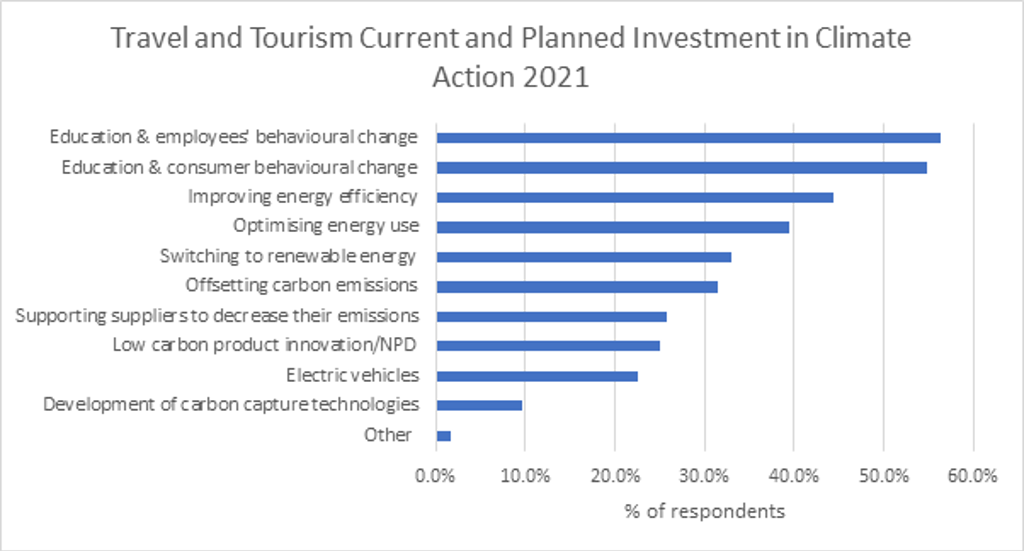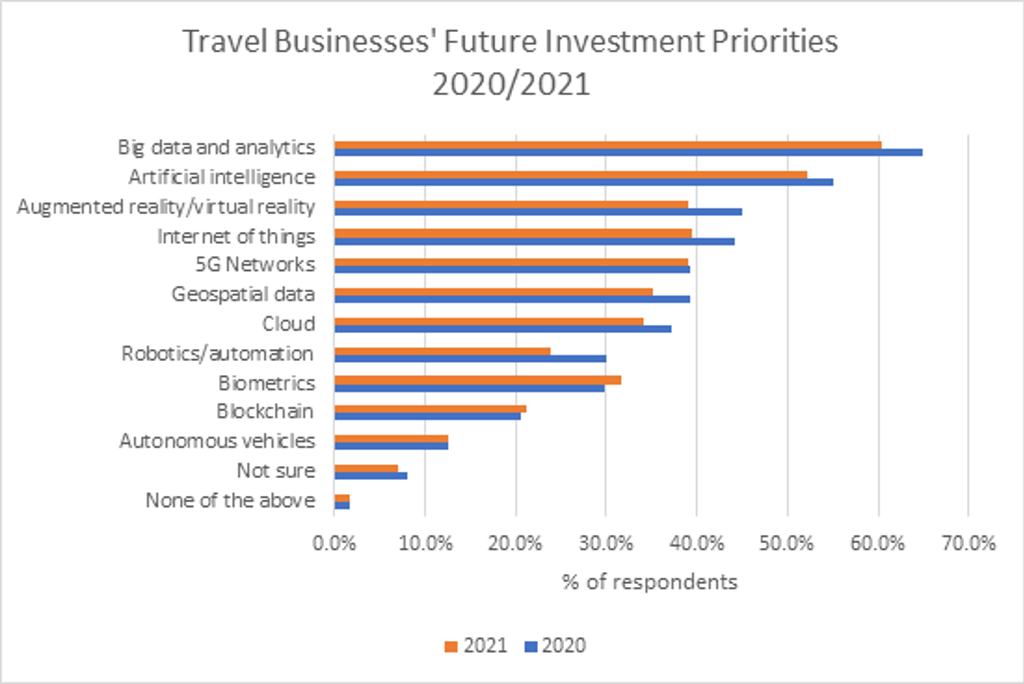Travel and tourism is at the epicentre of highly disruptive technological, social, political and environmental trends. The most interesting area of travel is where technology intersects with the climate emergency, giving rise to green tech innovation. The sense of urgency in the travel sector is palpable – 53.3% of travel businesses are already integrating sustainability features and initiatives into their innovation strategies and new product development in 2021. This is up an impressive 10 percentage points over 2020-2021, according to Euromonitor International’s Voice of the Industry Survey: Sustainability. Tellingly, even more (63%) travel businesses are planning to develop sustainable products and services over the next five years. The Coronavirus (COVID-19) pandemic has presented an opportunity for businesses to reset and rethink their strategies. We have identified three green tech innovations driving change in the travel industry:
1. Net Zero North Star
Transitioning to electric is a key lever for reducing travel’s carbon footprint for sustainable transformation. Next-generation technology is being tried and tested in aviation, including breakthroughs in sustainable aviation fuel and electric/hybrid aircraft to help reduce travel and tourism’s carbon footprint, which accounts for 8% of global carbon emissions.
Electric vertical take-off and landing aircraft (eVTOLs) are beginning to see the light of day. In the short term, the priority is carrying limited numbers of passengers; however, easyJet, Airbus and Boeing are looking at larger aircraft for over 100 people, which should be ready in the next 10 years, if not sooner.
Volocopter is one such next generation manufacturer, with its eVTOL aircraft and plans for a fully operational urban air mobility (UAM) ecosystem in Dubai by 2030, including infrastructure, digital technology, drones and aircraft. The company also has its sights set on Paris for the launch of its electric battery-powered air taxis in time for the Paris 2024 Olympics. It recently raised USD200 million in series D funding, including new investors such as BlackRock, and is the only company so far to receive EU safety approval through EASA.
The Voice of the Industry Survey: Sustainability shows that 22% of travel businesses are already looking to electric vehicles as a means to decarbonise in 2021. Going one step beyond, the UAE is a front runner in self-drive transport, trialling electric autonomous vehicles (AVs) in Sharjah, Abu Dhabi and Dubai. The country is ranked eighth in the KPMG Autonomous Vehicle Readiness Index 2020. Already famed for its trials of electric flying taxis, Dubai is pursuing an ambitious Autonomous Transport Strategy, aiming for 25% of all trips to be autonomous by 2030.
The transition to electric AVs has many benefits, such as reducing accidents, decreasing emissions by 12% and saving people 396 million hours spent in traffic – a boost to happiness. General Motors Cruise is rolling out a fleet of ride-sharing AVs in Dubai in 2023, a true game-changer.

Note: Survey fielded in June/July 2021
2. AI solutions for over-tourism
Our Voice of the Industry Survey: Sustainability reveals that 52.3% of travel businesses in 2021 are aiming to invest in artificial intelligence over the next five years to 2026. With powerful tools like AI only at the beginning of their evolution, there is huge potential for positive change in tackling the climate emergency.
Venice is a great example of mitigating tourism’s negative impacts through next gen technology. This iconic destination was a flashpoint for resident anger pre-pandemic due to capacity challenges with over-tourism. Various measures were introduced, such as barriers and turnstiles along with restrictions on cruise vessels. However, the biggest step forward in tackling destination management came with the launch of the Smart Control Room in October 2021, deploying the latest technology, like big data, AI/ML and the Internet of Things (IoT) to monitor and alleviate bottlenecks.
AI is used to monitor real-time data 24 hours a day, collected from 74 sensors on pedestrians and public transport such as vehicles and gondolas. Key to success will be interoperability across different organisations, along with plugging into nationwide schemes once also up and running.

Source: Euromonitor International – Voice of the Industry Survey: Travel
Note: Survey fielded in April/May 2020 and 2021
3. Energy-inspired innovation through carbon capture
Direct carbon capture is an interesting area of innovation in terms of achieving net zero and driving operational energy efficiencies. However, only 9.7% of travel businesses will implement direct air capture to reduce carbon emissions in 2021, according to Euromonitor International’s Voice of the Industry Survey: Sustainability. There is clearly much work to be done to think bold on how travel businesses engage with energy.
One such pioneer is Tomorrow’s Air, a global collective for carbon removal, with its origins in the Adventure Travel Trade Association. As a platform for industry, consumers and artists, the collective enables the removal of CO2 and permanently stores it using Climeworks cutting-edge direct air capture technology (DAC). Large-scale solutions such as DAC are required if 10 gigatons of carbon are to be removed from the atmosphere annually by 2050 to avoid 2˚C warming.
In September 2021, Orca by Climeworks was launched in Iceland. It is the world’s first large-scale direct air capture plant, removing 4,000 tonnes of carbon per year. Orca filters atmospheric carbon to use in the circular economy, as well as removing and storing it permanently underground. Storage is conducted by Carbfix, turning CO2 into stone underground in a couple of years. In Iceland, next gen energy solutions meet tourism, with Orca situated close to the Geothermal Exhibition and not far from the Blue Lagoon.
Time for change
Post-pandemic, the flawed tourism model needs to adapt and transition to a fairer, people-centric and planet-friendly model. Every player in the travel and tourism supply chain, direct or indirect, needs to accelerate sustainable actions for the benefit of all local communities that depend on tourism for their livelihoods and opportunities.
Tourism must transition to a quality over quantity model, in keeping with the 1.5˚C pathway required to avert the climate emergency. Daunting as it is, travel businesses have never had it so good in terms of access to next gen technology to drive innovation across operations, new product development and to spark emotional ties with consumers in this shared endeavour to protect the planet.
For further next gen green technology analysis, you can download the white paper Travel Rewired: Innovation Strategies for a Resilient Recovery
